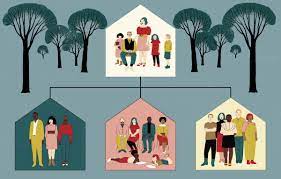Eps 1: the future of family
The future of families will be dramatically different from what was considered as typical or normal. The decline in marriage rates and the increase in non-marital relationships will change the structure and dynamics of the family. It is predicted that family units will become smaller and more individualized, and more diverse with regards to race and ethnicity. Technology will play a significant role in how families interact with each other, with more people choosing to have distant relationships facilitated by technology. As people prioritize their careers and personal fulfillment more than marriage, they will increasingly delay or forgo having children. In conclusion, the future of the family will emphasize more on individualization, smaller units, diversity, and use of technology for communication.
| Seed data: | Link 1 |
|---|---|
| Host image: | StyleGAN neural net |
| Content creation: | GPT-3.5, |
Host

Jared Morris
Podcast Content
One emerging trend in the family dynamic is the rise of non-traditional living arrangements. With increasing urbanization and economic uncertainty, more people are choosing to live together in communal settings. In these households, families may include friends, extended family members, or even strangers who share common interests and values. This type of arrangement allows for shared resources, social support, and a sense of community that can be difficult to achieve in traditional nuclear families.
Another trend that is likely to affect the future of family is the rise of technology. Technology has already changed the way we work, communicate, and consume media. In the future, we can expect to see even more integration of technology in our daily lives, including in our homes and family relationships. Smart homes, virtual reality, and artificial intelligence are just a few of the potential technologies that could impact the family unit. While these advancements may offer convenience and connectivity, they also raise important questions about privacy, security, and the role of human interaction in our lives.
One aspect of family life that is unlikely to change is the importance of relationships. No matter how families are structured or what technological advancements emerge, human connection and emotional support will always be essential. This is especially true when it comes to raising children. While the ways in which we parent may evolve, the need for love, nurturing, and guidance will remain the same.
However, parenting can also be a source of stress and conflict. In an era where work-life balance is increasingly difficult to achieve, parents may struggle to meet the demands of both their careers and their families. This can lead to burnout and strain on relationships. To address this challenge, we may see more policies and practices that prioritize work-life balance, such as flexible scheduling and paid parental leave.
Finally, one of the biggest challenges facing families in the future is the impact of climate change. Climate change poses a threat to our planet, our communities, and our families. From natural disasters to food shortages to health risks, climate change will affect every aspect of our lives. As such, we will need to work together as families and as a society to mitigate its effects and adapt to the changes ahead.
In conclusion, the future of family promises to be dynamic and ever-evolving. As we navigate emerging trends and face new challenges, it’s important to remember the importance of human connection, emotional support, and adaptability. By working together and embracing change, we can build stronger and more resilient families for generations to come.
